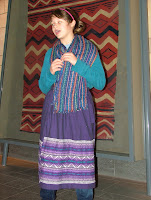One of the Occupation groups (see below for explanation) this Fall is

studying sheep. The students noticed that the sheep frequently burp. The question, "why do sheep burp?" led to a lesson on ruminant digestion and a fermentation experiment.
To simulate the fermentation that happens in one of the sheep's four stomachs, the students combined yeast, water, and sugar in flasks and attached balloons to the top of the jar. Learning about variables, some changed the amount of sugar or yeas

t, or varied the temperature. The amount of gas released was measured by placing the balloons in water and measuring the displacement.
Many Montessori Adolescent Programs use the terminology Occupation and Humanities Projects for the long term interdisciplinary studies in the curriculum. Occupation projects are science based, and revolve around the real needs of the farm (for instance, Sheep because this will be the first time we breed the sheep, or Wind Energy because we need to install a windmill to aerate the pond). The science standards of learning are covered through this project-based approach. They are called Occupations because they reflect the developmental needs of young adolescents as they look to the adult world and wonder "how will I contribute to society?" "What will I do?" They are trying on the occupation of farmer, naturalist, biologist, engineer, or veterinarian to see how it fits.
 lmination of our Humanities study of the Ancient Mayan Civilization, Farm School students wrote Dramatis Peronae (short monologues) of individuals from the Ancient Mayan Culture. On Monday, we went into Washington, DC, and each student found a place to perform that best suited their character. Here are some examples:
lmination of our Humanities study of the Ancient Mayan Civilization, Farm School students wrote Dramatis Peronae (short monologues) of individuals from the Ancient Mayan Culture. On Monday, we went into Washington, DC, and each student found a place to perform that best suited their character. Here are some examples: 














